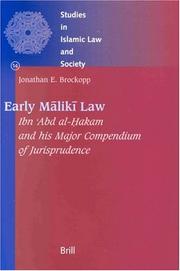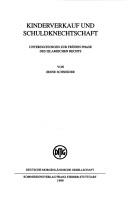| Listing 1 - 7 of 7 |
Sort by
|

ISBN: 9789004492059 9789004116283 Year: 2000 Publisher: Leiden; Boston : BRILL
Abstract | Keywords | Export | Availability | Bookmark
 Loading...
Loading...Choose an application
- Reference Manager
- EndNote
- RefWorks (Direct export to RefWorks)
This study presents the first biography of 'Abd Allāh b. 'Abd al-ḥakam (d. 214/829), an important figure in the nascent Mālikī school, and introduces his compendium of law. The subject of the Arabic text is the law of slavery, and two chapters examine early Mālikī slave law in the context of other Near Eastern legal codes. The narrow focus on Ibn 'Abd al-ḥakam and his Compendium is used to refine the distinction between "organic" and "fixed" editions of early legal texts, and also to argue that these texts can be used to reconstruct the thought of even earlier figures, such as Mālik B. Anas (d. 179/795). Early Mālikī Law should be of value to legal historians, scholars of religion and all those working in the developing field of Slave Studies. The valuable conclusions arising from this study of a single legal text indicate the importance of continued analysis of these early documents, both the few that have been published and the many which remain unexplored in manuscript collections.
Book
ISBN: 9780674050594 0674050592 Year: 2010 Publisher: Cambridge, Mass. : Harvard University Press,
Abstract | Keywords | Export | Availability | Bookmark
 Loading...
Loading...Choose an application
- Reference Manager
- EndNote
- RefWorks (Direct export to RefWorks)
Book
ISBN: 0674059174 9780674059177 9780674050594 0674050592 Year: 2010 Publisher: Cambridge, MA
Abstract | Keywords | Export | Availability | Bookmark
 Loading...
Loading...Choose an application
- Reference Manager
- EndNote
- RefWorks (Direct export to RefWorks)
A remarkable research accomplishment. Ali leads us through three strands of early Islamic jurisprudence with careful attention to the nuances and details of the arguments.
Marriage (Islamic law) --- Concubinage (Islamic law) --- Slavery (Islamic law) --- Islamic law --- Marriage law (Islamic law)

ISBN: 3515070869 9783515070867 Year: 1999 Volume: 52/1 Publisher: Stuttgart Franz Steiner Verlag
Abstract | Keywords | Export | Availability | Bookmark
 Loading...
Loading...Choose an application
- Reference Manager
- EndNote
- RefWorks (Direct export to RefWorks)
Chari'a --- Children [Islamic ] --- Children [Muslim ] --- Droit islamique --- Islamic law --- Islamitisch recht --- Mohammedaans recht --- Muslim children --- Shari'a --- Sjari'a --- Peonage (Islamic law) --- Debtor and creditor (Islamic law) --- Slavery (Islamic law) --- Children (Islamic law) --- Slavery --- Law and legislation --- Islam

ISBN: 1134193106 1280347597 9786610347599 0203086945 9780203086940 041537250X 9781134193059 9781134193097 9781134193103 9780415372503 9780415553841 1134193092 Year: 2006 Publisher: New York, NY : Routledge,
Abstract | Keywords | Export | Availability | Bookmark
 Loading...
Loading...Choose an application
- Reference Manager
- EndNote
- RefWorks (Direct export to RefWorks)
The Power of Sovereignty explores the religio-political and philosophical concepts of Sayyid Qutb, one of the most influential political thinkers for contemporary Islamists and who has greatly influenced the likes of Osama Bin Laden. Executed by the Egyptian state in 1966, his books continue to be read and his theory of jahiliyya 'ignorance' is still of prime importance for radical Islamic groups. Providing a detailed perspective of Sayyid Qutb's writings, this book examines:the relation between the specifics of the concept of hakimiyyah and that of jahiliyyah
Islam and state. --- Sovereignty --- Islam --- Slavery (Islamic law) --- Islamic law --- Mosque and state --- State and Islam --- State, The --- Ummah (Islam) --- Religious aspects --- Islam. --- Universality. --- Quṭb, Sayyid, --- Quṭb, Saiyid, --- Kotb, Sayed, --- Qutb, Sayyed, --- Kutub, Seyyid, --- Qutb, Syed, --- Shādhilī, Sayyid Quṭb Ibrāhīm Ḥusayn, --- Qutb, Sayed, --- Qudub, Sayid, --- Sayid Qudub, --- Qotb, Sayed, --- Kutb, Sayyid, --- Qutub, Said, --- Qotb, Seyyed, --- Qut̤b, Muḥammad, --- Muḥammad Qut̤b, --- Qutb, Mohammad, --- Mohammad Qutb, --- سيد قطب --- قطب، سيد --- قطب، سيد، --- Sayyed Qotob, --- Qotob, Sayyed, --- Sayyid Quṭb, --- Qutub, Săyyid, --- Qutup, Săyyid, --- Slavery (Islamic law). --- Quṭb, Sayyid, --- Quṭb, Sayyid --- Qutb, Sayyid,
Book
ISSN: 24054585 ISBN: 9789004364813 9004398791 9004364811 9789004398795 9789004447240 Year: 2019 Volume: 8 Publisher: Leiden ; Boston : Brill,
Abstract | Keywords | Export | Availability | Bookmark
 Loading...
Loading...Choose an application
- Reference Manager
- EndNote
- RefWorks (Direct export to RefWorks)
In 'Possessed by the Right Hand', the first comprehensive legal history of slavery in Islam ever offered to readers, Bernard K. Freamon, an African-American Muslim law professor, provides a penetrating analysis of the problems of slavery and slave-trading in Islamic history. After examining the issues from pre-Islamic times through to the nineteenth century, Professor Freamon considers the impact of Western abolitionism, arguing that such efforts have been a failure, with the notion of abolition becoming nothing more than a cruel illusion. He closes this ground-breaking account with an examination of the slaving ideologies and actions of ISIS and Boko Haram, asserting that Muslims now have an important and urgent responsibility to achieve true abolition under the aegis of Islamic law.
Slavery and Islam --- Slavery --- Slavery (Islamic law) --- Slavery - Islamic countries --- Islamic law --- Abolition of slavery --- Antislavery --- Enslavement --- Mui tsai --- Ownership of slaves --- Servitude --- Slave keeping --- Slave system --- Slaveholding --- Thralldom --- Crimes against humanity --- Serfdom --- Slaveholders --- Slaves --- Islam and slavery --- Slavery (Islam) --- Islam --- Enslaved persons --- Esclavage --- Esclavage (Droit islamique) --- Sklaverei --- Sklavenhandel --- Islamisches Recht --- Rechtskultur --- Slavery and Islam. --- Aspect religieux --- Islam. --- Droit islamique --- Islamic countries --- Islamische Staaten
Book
ISBN: 0700700099 9780700700097 Year: 1977 Publisher: London Curzon
Abstract | Keywords | Export | Availability | Bookmark
 Loading...
Loading...Choose an application
- Reference Manager
- EndNote
- RefWorks (Direct export to RefWorks)
Domestic relations (Islamic law) --- Inheritance and succession (Islamic law) --- Slavery (Islamic law) --- Jewish law --- Law, Ancient --- Islamic law. --- Ancient law --- Biblical law --- Civil law (Jewish law) --- Halacha --- Halakha --- Halakhah --- Hebrew law --- Jews --- Law, Hebrew --- Law, Jewish --- Law, Mosaic --- Law in the Bible --- Mosaic law --- Torah law --- Law, Semitic --- Commandments (Judaism) --- Civil law (Islamic law) --- Law, Arab --- Law, Islamic --- Law in the Qurʼan --- Sharia (Islamic law) --- Shariʻah (Islamic law) --- Law, Oriental --- Law --- Islamic law
| Listing 1 - 7 of 7 |
Sort by
|

 Search
Search Feedback
Feedback About UniCat
About UniCat  Help
Help News
News